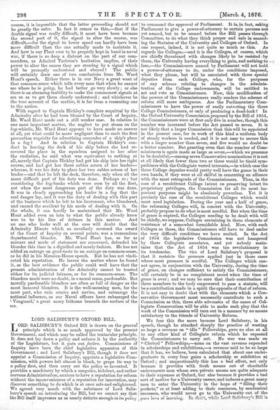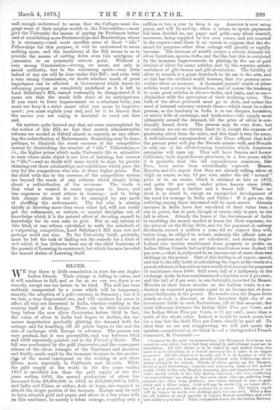LORD SALISBURY'S OXFORD BILL.
to command the approval of Parliament. It is, in fact, asking Parliament to give a power-of-attorney to certain persons not yet named, but to be named before the Bill passes through Committee, to do what they think proper and safe in amend- ing the Statutes of the University and Colleges of Oxford. In one respect, indeed, it is not quite so much as 'this. As regards the Colleges,—and it is the Colleges, of course, which are chiefly threatened with changes likely to be resisted by them, the University having everything to gain, and nothing to lose,—the Commissioners named by Parliament will not hold a power-of-attorney to do, under the conditions imposed, what they please, but will be associated with three special deputies from each College, who, for the purposes of any scheme relating to changes in the adminis- tration of the College endowments, will be entitled to act and vote as Commissioners. Now, this modification of the powers of the Commissioners really renders the scheme of reform still more ambiguous. Are the Parliamentary Com- missioners to have the power of easily outvoting the three College Commissioners, or only of producing a dead-lock? In the Oxford University Commission proposed by the Bill of 1854, the Commissioners were at first only five in number, though this number was increased before the Act passed to seven. It is not likely that a larger Commission than this will be appointed in the present ease, for in work of this kind a uniform body of steady workers is needed, and it is not easy to secure this with a larger number than seven, and five would no doubt be a better number. But granting even that the number of Com- missioners is again made as large as seven,—which we presume to be doubtful,—among seven Conservative nominations it is not at all likely that fewer than two or three would be timid sym- pathisers with the Collegiate vested interests,—in which case the three College deputies would pretty well have the game in their own hands, if they were at all skilful in cementing an alliance with the most retrograde of the Commissioners. Thus, in the case of a recalcitrant College intent on preserving intact its proprietary privileges, the Commission for all its most im- portant purposes might be absolutely powerless. Yet it is precisely the case of the recalcitrant Colleges which would most need legislation. During the year and a half of grace, the reforming Colleges will, in concert with the University, probably propose to do what is most needful. But when the time of grace is expired, the Colleges needing to be dealt with will be c.hiefiyove suppose, Colleges containing in them elements of resistance of a somewhat formidable kind. Now, with such Colleges as these, the Commissioners will have to deal under the very difficult conditions we have recited. In the Act of 1854 the legislative Commission was not hampered by these Collegiate associates, and yet nobody main- tains that the Act of 1854 was too revolutionary in its tendencies. The vice of Lord Salisbury's proposal is that it restricts the pressure applied just in those cases where mast pressure is needful. The Colleges which can- not agree, in conjunction with the University, during the time of grace, on changes sufficient to satisfy the Commissioners, will certainly be in no complaisant mood when the time of grace is over ; and we may be sure that their contribution of three members to the body empowered to pass a statute, will be a contribution made in a spirit the opposite of that of reform. It is not easy to doubt that with the elements which a Con- servative Government must necessarily contribute to such a Commission as this, three able advocates of the cause of Col- legiate Conservatism will be able to make such play that the work of the Commission will turn out in a manner'by no means satisfactory to the friends of University Reform.
We fear this the more because Lord Salisbury, in his speech, though he attacked sharply the practice of wasting so large a revenue on " idle " Fellowships, gave no clue at all to any other kind of Collegiate reform which he expected the Commissioners to carry out. No war was made on " Clerical" Fellowships,—none on the vast revenue expended in scholarships and exhibitions,—a revenue said to be so large that it has, we believe, been 'calculated that about one under- graduate in every four gains a scholarship or exhibition at Oxford ; and unquestionably this has a bad effect, not only because it provides with fresh means out of charitable endowments men whose own private means are quite adequate to their expenses at Oxford, but also because it provides a bad sort of motive for a' niversity career, and induces a great many men to enter the University in the hope of " filling their pockets," or at least adding to their resources, by academical successes, who would never go to the University out of the pure love of learning. In short, while Lord Salisbury's Bill is well enough understood to mean that the Colleges must dis- gorge some of their surplus wealth to the Universities,—must give the 'University the means of paying its Professors better and of establishing more Professorships and Readerships, where it is necessary,—and must sacrifice some of those " idle " Fellowships for this purpose, it will be understood to mean nothing more, and the machinery of the Bill seems to us to provide the means of cutting down even this minimum of -ebncession to an extremely minute point. Without a very strong Commission—strong, we mean, not only in moral authority, but in the reforming spirit—very little indeed of any use will be done under this Bill ; and even with a very strong Commission, we doubt whether much of great importance can be effected. A Government which leaves its reforming purpose so completely undefined as it is left in Lord Salisbury's Bill, cannot reasonably be disappointed if it turns out that the result falls short of its anticipations. If you want to force improvement on a reluctant body, you must not keep it a strict secret what you mean by improve- ment ; you must explain your end, and let it be known that the means you are taking is intended to carry out that end.
On matters quite beyond any that are even contemplated by the author of this Bill, we fear that certain administrative reforms are needed at Oxford almost as urgently as any affect- ing the redistribution of Endowments. Something may be done, perhaps, to diminish the worst excesses of the competitive system by diminishing the number of " idle" Fellowships,- i.e., the higher prizes which make University life so attractive to men whose main object is not love of learning, but success in " life,"—and no doubt still more would be done by greatly thinning-out those scholarships and exhibitions which pave the way for the competitors who aim at those higher prizes. But the chief evils due to the excesses of the competitive system are beyond the reach of any reforms which simply bring about a redistribution of the revenues. The truth is that what is wanted is more eagerness to learn, and less eagerness to excel others in learning ; and to bring this change about is not to be managed by any mode of shuffling the endowments. The lad who is aiming chiefly at knowing more than some other lad, will not really get the refinement, or culture, or mental discipline out of knowledge which it is the natural effect of devoting oneself to knowledge for its own sake to give. But at any reform of this kind, at any reform calculated to undo the mischiefs of a vulgarising competition, Lord Salisbury's Bill does not and perhaps could not aim. To the University itself, probably, must be left the task of finding out the remedy for a kind of evil which it has hitherto been one of the chief functions of the pursuit of Learning to counteract, but which has now invaded the inmost shrine of Learning itself.



































 Previous page
Previous page